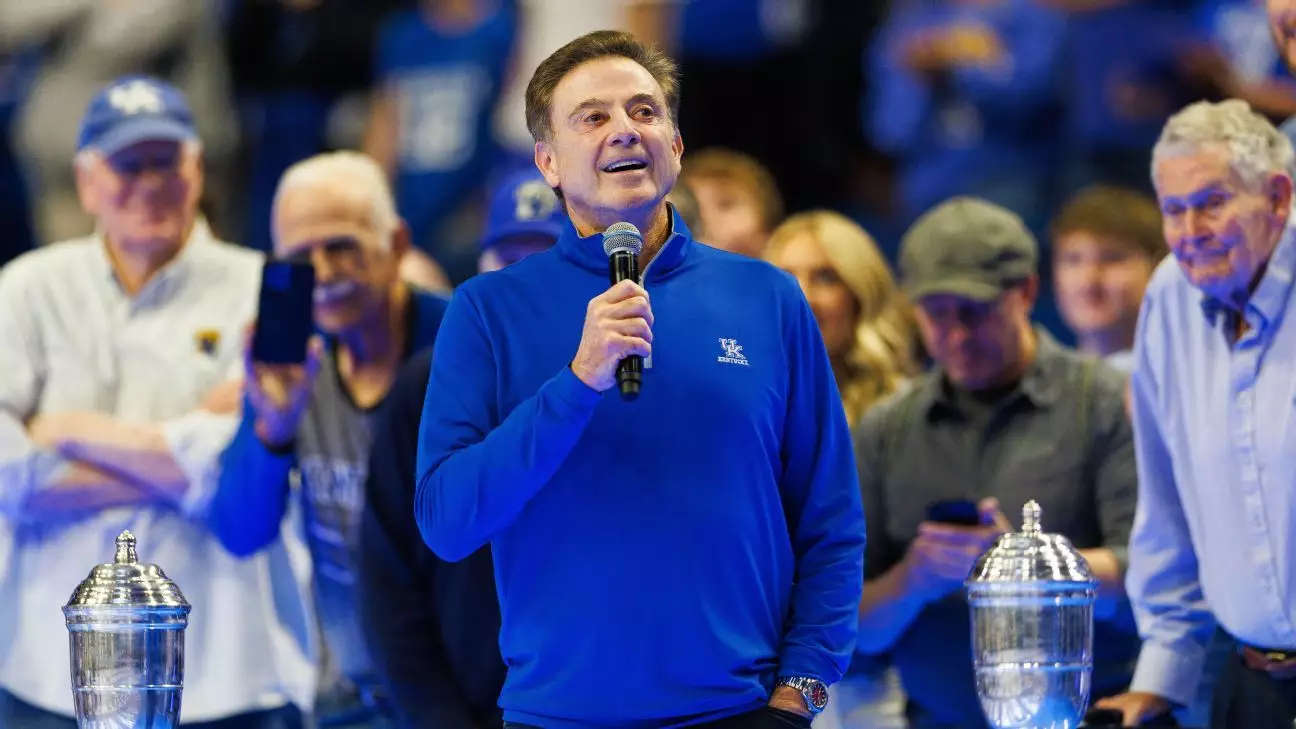Rick Pitino, a name synonymous with Kentucky basketball glory, made a remarkable return to Rupp Arena on a Friday evening, stirring emotions and provoking nostalgia among long-time fans. Nearly thirty years after guiding the Wildcats to the pinnacle of college basketball with the 1996 national championship, Pitino re-entered the arena, this time adorned in a Kentucky sweater, a gesture signifying his affection for the school. The atmosphere was electric as cheers reverberated throughout the venue, a departure from the chilly receptions he had experienced on previous visits as coach of the University of Louisville. This event, known as Big Blue Madness, marked not only the beginning of the college basketball season but also a unique chapter in Pitino’s complicated history with Kentucky.
Pitino’s return resonated deeply, filled with emotional undertones that spoke volumes about his past. Surrounded by former players and warmly greeted by a loyal fan base, he took a moment to collect himself before addressing the crowd. “I am so happy to be back,” he proclaimed, revealing a depth of feeling that underscored the significance of the occasion. Pitino poignantly remarked on his desire to return to “Camelot” one last time—an evocative metaphor that references the golden era of Kentucky basketball under his leadership. The joy he felt was palpable; for him, it represented not just personal nostalgia but a connection to the fans who stood by him during his eight-year tenure.
The Rollercoaster Legacy
Yet, Pitino’s journey back to Kentucky was not without its bumps. The landscape of his relationship with the Kentucky basketball community was fraught with challenges and controversies. After achieving unprecedented success at Kentucky, Pitino accepted an ambitious 10-year contract with the Boston Celtics in 1997. However, his NBA tenure quickly devolved into turbulence, leading to his resignation just a few seasons in. His subsequent move to Louisville in 2001 ignited an already fierce rivalry between the two schools, a shift that was laden with criticism from Kentucky supporters.
Pitino’s arrival at Louisville brought about mixed emotions from fans who once idolized him. His initial acknowledgment of the animosity he would face highlighted the complexities of intercollegiate rivalries, especially one as heated as Kentucky-Louisville. As John Calipari took the helm for Kentucky in 2009, the rivalry reached new heights, echoing with intense emotions and competitive spirit. Underlining the depth of bitterness, Pitino described the rivalry prior to a 2012 Final Four matchup as one fueled by “pure hatred.” This animosity, combined with incidents such as his contentious gestures at Kentucky crowds, cemented a volatile relationship with the Wildcat fanbase.
Despite these past grievances, Pitino’s return was softened by the hiring of Mark Pope—a captain of the 1996 championship team—by Kentucky earlier in the year. This development symbolized a new era for both the Wildcats and for Pitino himself. His longstanding mentorship of Pope likely softened the hearts of Kentucky fans, a transition that emphasized reconciliation over rivalry. His belief in Pope’s abilities resonated during his address, where he preached optimism about Kentucky’s future in NCAA basketball.
In a heartwarming moment, Pitino urged the crowd to rally behind Pope, emphasizing that it was not about him but rather about the essence of Kentucky basketball. He painted Pope as a humble and selfless leader who would guide the program towards a brighter chapter, leaving the shadows of past disappointments behind. Pitino’s endorsement came at a crucial time; Kentucky had faced challenges with premature NCAA tournament exits, and Pitino expressed faith in the healing capabilities of sport and community.
Rick Pitino’s homecoming to Kentucky serves as a reminder of the complex tapestry that college athletics can be—a blend of triumph, betrayal, and ultimately, redemption. His narrative intertwines with that of Kentucky basketball, transforming from an emblem of rivalry to a figure of reconciliation. This moment not only marks a joyful resurgence in Pitino’s storied career but also offers Kentucky fans a chance to embrace change and celebrate the future under their new leader, Mark Pope. Here, amidst the echoes of history, the stage is set for renewal, showcasing that even in the world of college sports, the spirit of community and the power of forgiveness can pave the way for greatness.



Leave a Reply